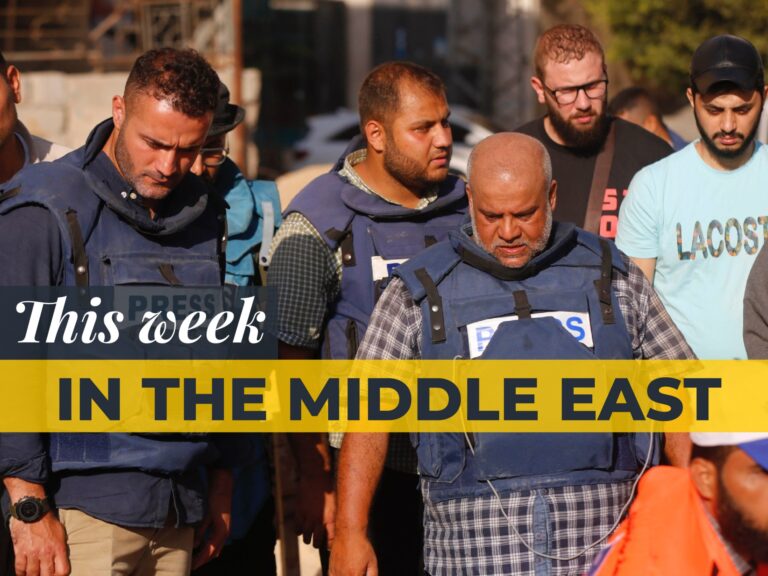Israeli air raids killed the family of Al Jazeera’s Wael Dahdouh – we continue our coverage of Gaza this week.
Israeli airstrikes killed the wife, son, daughter and two grandchildren of Al Jazeera’s Wael Dahdouh in Gaza. He received the call while covering the news and rushed to the hospital where the overflowing morgues forced him to say goodbye to his loved ones lying on the ground. We continue our coverage of Gaza this week:
When “the voice of Gaza” lost his family
Wael Dahdouh was live when he heard the news: an Israeli raid had destroyed the house his family was in. His wife, son, daughter and two grandchildren died.
The veteran Al Jazeera correspondent’s family had fled Israeli bombing in Gaza City to stay with relatives in the Nuseirat refugee camp – an area that Israel had occupied. It was deemed safe to evacuate there.
His daughter, Sham, was seven years old and his son Mahmoud, a high school student who wanted to become a journalist like his father.
Al Jazeera’s Arabic anchor Tamer Almisshal said the killing of Dahdouh’s family members was a deliberate targeting of Palestinian journalists by Israel.
He called his colleague the “voice of Gaza.”
“His voice will continue – we can guarantee it. All our voices will continue and we will continue to cover this assault to bring out the truth every day,” Almisshal said.
When Dahdouh bid farewell to his family, they lay on the ground, with no place anywhere else as the death toll mounted in hospitals across the Gaza Strip.
For several days, surgeons in the Gaza Strip have been operating under the glow of their cell phonesconserving energy so that ventilators and other machines keeping patients alive can continue to operate.
But now, one by one, the inhabitants of the enclave hospitals become darkof which 10 out of 35 are now out of service as Israel’s siege of vital supplies, including fuel for generators, approaches its third week.
The doctors are forced to work 24 hours a day as they face a severe shortage of supplies and medicine. Some aid was allowed to cross the border into Egypt this week, but it is only a tiny fraction of what is needed, aid organizations say.
And as access to clean water dwindles, the threat of cholera and other water-borne diseases feature prominently.
But despite the Israeli bombardment of the besieged enclave, there were small moments to be grateful for.
In the neonatal intensive care unit of al-Shifa Hospital, for example, a premature baby survived an emergency cesarean section performed on his deceased motherMaryam, after an air attack on her house.
Yet with so many people killed, few people cry the death of women like Maryam, who never saw her baby. In just one night this week, 700 Palestinians were killedthe highest number in a 24-hour period since the start of the conflict.
Among the dead was Sameh Murad’s wife, who died during an air attack targeting a convoy of fleeing civilians.
“She was the love of my life” Murad told Al Jazeera. “I don’t think I’ll ever meet anyone like her again.”
Meanwhile, survivors of the air attacks say they feel like they are dying every day.
“(Israel) wants us to be in eternal exile and terrorized for the rest of our lives” said Abdulrahmanwho witnessed an explosion a few hundred meters from him and his family.
Places of refuge such as churches were not spared this week either, with the oldest Greek Orthodox church in the territory bombed. Neither journalists.
Hamas freed two captives this week, but the group said Israel had refused to accept them, a claim the Israeli government called propaganda.
But amid the unrelenting terror and trauma caused by the missiles and siege, a community was formed.
On the sidewalk in front of the Abu Assi family home in Bani Suhaila, southern Gaza, large pots of food are prepared daily to feed thousands of displaced Palestinians.
“We cannot accept that hungry people cannot find food,” Abu Assi said.
Elsewhere in the region, something different
In the Zeyrek district of Istanbul, a UNESCO World Heritage Site, there is another remarkable vestige of history: the Hamam Cinilia 500-year-old Turkish bath dating from the height of the Ottoman Empire.
Today, after 13 years of ambitious restoration efforts, this lost treasure has reopened.
Briefly
Quote of the week
“Noor’s tearful voice on the phone from Doha, begging us to take photos of her family already buried in silence, evoked the words of Palestinian poet Mahmoud Darwish: ‘Death does not harm the dead, it only harm the living.’ .’” | Al Jazeera’s Maram Humaid, writing after speaking to Noor, a friend whose family of nine was killed in Gaza.


